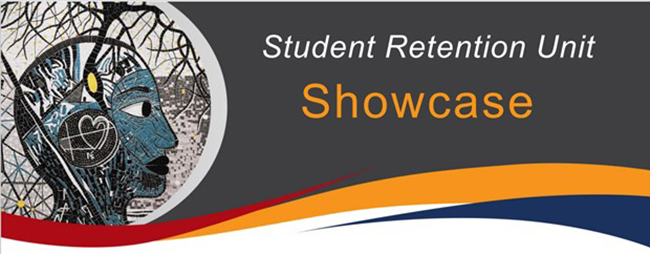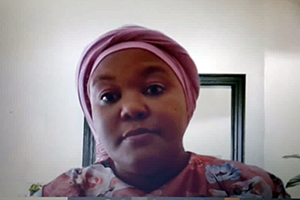News & Events
Ensuring successful transition for first-time students
The Unisa Student Retention Unit (SRU), under the Department of Tuition Support and Facilitation of Learning, held its showcase on 01 December 2021, a day which is also commemorated as World AIDS Day. The virtual showcase provided an opportunity for stakeholders to engage with student success practitioners, with the aim of ensuring an integrated approach to student support initiatives in 2022.

As he welcomed the mass, Lekau Rachidi, Manager: Student Retention Unit, provided the background of the unit, which started as a Department of Higher Education and Training funded project in 2018. “The mandate of the SRU is student retention and success,” he said. “We do this by developing programmes and initiating projects that are indicative of efforts to support our students, and enable them to have the best possible chance of success.”
As to the purpose of the showcase, Rachidi later presented on the work that the SRU has been engaging in, both implemented and planned going forward. Some of the aspects that he touched on included communication platforms, financial literacy and quality assurance. He said: “The SRU and Unisa’s College of Accounting Sciences are working together to provide financial literacy for students.” The primary focus was on the First-Year Experience (FYE) Massive Open Online Course (MOOC), which aims to assist first-time entering students to successfully transition into the university.

Prof Sindile Ngubane
Unisa’s Professor Sindile Ngubane, Head of Department: Institute for Open and Distance Learning, presented on “Student retention in the open distance learning context”. She raised critical questions such as how Unisa bridges the transactional distance, and how it involves students in co-creating support strategies for a positive FYE. “We need to move towards epistemic initiation as compared to just student orientation,” she remarked.
“We need to think critically about how we give hope to our people, by making sure that when they come in at Unisa, they do not just have access through registration, but are actually retained and succeed in their degrees,” she continued. “We need to use Ubuntu as grounding to our practice, we cannot be student-centred unless we inculcate Ubuntu where we want the best for our students.”
The presentations by the unit’s student success practitioners focused on, among others, “Big Data and Predictive Analytics in Higher Education: opportunities, challenges, and future directions”, by Jaroslaw Adamiak, “Supporting student success and retention: Strategies for institutional change”, by Ziyanda Febana, and “Rethinking Institutional Readiness for Student Success”, by Ntokozo Zulu.

Jaroslaw Adamiak
In terms of challenges, Adamiak looked at, among others, bias in data and algorithms, misuse of data, and resistance to change. As part of future direction, he stated: “The SRU will implement some of the adaptive technologies in first-year support.” Febana briefly shared the experiences of first-year students, including of students with disabilities. She further shared how Unisa contributes to the national and international discourse on teaching and learning. In her presentation, Zulu spoke on the SRU’s interventions to inspire and motivate students in an ODeL environment.
The unit invited critical reviewers from a college, region and deanery to share their perspectives on the SRU and the presentations from the showcase. From a college perspective, Dr Nicky Tjano, Coordinator: Technology-Enhanced Teaching, Office of Tuition and Student Support under the College of Economic and Management Sciences, identified some areas of improvement. These areas include coming up with a coordinated approach on interventions across colleges, that would assist with evaluation and monitoring, and the consideration of time factor for interventions. He applauded the SRU for acknowledging that students with disabilities should not be an after-thought, and that there needs to be enhancement of communication platforms.
Representing the regions, John Abrahams, Head: Facilitation of Learning in the Western Cape, expressed satisfaction with the SRU’s openness to integrate and collaborate. He commented: “For modules and students at risk, we need to have a common understanding of what it means. We need to ask if supporting modules at risk, means supporting students at risk.” Acknowledging how enormous Unisa is, he urged that there should be a way to reach out to students and address their individual needs.
Dr Olwethu Sipuka, Unisa’s Dean of Students, thanked participants for their insightful presentations and said that they give a way to look at the kind of services that Unisa is offering to its students. He briefly reflected on how strained the national higher education, and the education system, in general, currently is. Sipuka also highlighted the importance of student retention.
In closing, Nelisa Tshaka, Unisa’s Acting Director: Directorate Instructional Support and Services, thanked all the presenters and critical reviewers for their insightful presentations, and confirmed that the purpose of the showcase was achieved. “We are sure that the SRU is doing what is expected of it. Today’s proceedings are a call for action, and the presentations enlightened us,” she concluded.
*By Nancy Legodi, Acting Journalist, Department of Institutional Advancement
Publish date: 2021-12-03 00:00:00.0

